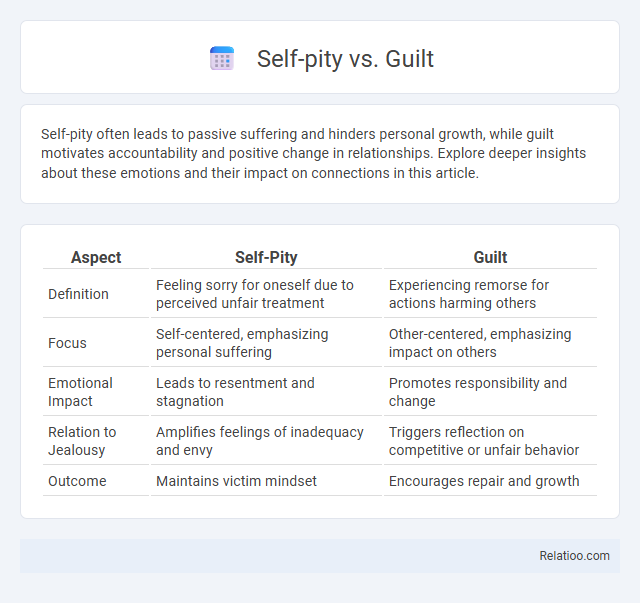Self-pity often leads to passive suffering and hinders personal growth, while guilt motivates accountability and positive change in relationships. Explore deeper insights about these emotions and their impact on connections in this article.
Table of Comparison
| Aspect | Self-Pity | Guilt |
|---|---|---|
| Definition | Feeling sorry for oneself due to perceived unfair treatment | Experiencing remorse for actions harming others |
| Focus | Self-centered, emphasizing personal suffering | Other-centered, emphasizing impact on others |
| Emotional Impact | Leads to resentment and stagnation | Promotes responsibility and change |
| Relation to Jealousy | Amplifies feelings of inadequacy and envy | Triggers reflection on competitive or unfair behavior |
| Outcome | Maintains victim mindset | Encourages repair and growth |
Understanding Self-Pity: Definition and Signs
Understanding self-pity involves recognizing it as an emotional state where you excessively focus on your own misfortunes, often accompanied by feelings of helplessness and victimization. Key signs include persistent negative self-talk, reluctance to seek solutions, and dwelling on perceived injustices without taking proactive steps. Differentiating self-pity from guilt and self-compassion can help you manage these emotions more effectively and promote healthier coping mechanisms.
What is Guilt? Emotional Roots and Manifestations
Guilt arises from a deep emotional recognition that you have caused harm or violated your own moral standards, often rooted in empathy and responsibility. It manifests through feelings of remorse, regret, and a desire to make amends, distinguishing it from self-pity, which centers on feeling sorry for oneself without accountability. Understanding guilt's emotional roots helps you process these feelings constructively, promoting personal growth and healthier relationships.
Key Differences Between Self-Pity and Guilt
Self-pity involves feeling sorry for yourself and dwelling on personal misfortune, while guilt arises from recognizing that your actions have caused harm or wrongdoing to others. The key differences between self-pity and guilt lie in their emotional focus: self-pity centers on personal suffering, whereas guilt centers on moral responsibility and the desire to make amends. Understanding these distinctions helps You manage emotions more effectively and fosters healthier coping mechanisms.
Psychological Impact of Self-Pity
Self-pity often leads to a cycle of negative thoughts that reinforce feelings of helplessness and low self-esteem, exacerbating emotional distress. Unlike guilt, which can motivate corrective actions and personal growth, self-pity tends to foster passivity and rumination without resolution. Psychological studies highlight that prolonged self-pity impairs resilience, increasing vulnerability to depression and anxiety disorders.
The Role of Guilt in Personal Growth
Guilt acts as a crucial emotional signal that encourages self-reflection and accountability, fostering personal growth by motivating individuals to amend their mistakes and improve behavior. Unlike self-pity, which often leads to stagnation by fixating on one's misfortunes, guilt prompts proactive change and deeper empathy towards others. Recognizing the constructive role of guilt enables healthier emotional processing and supports the development of resilience and moral integrity.
How Self-Pity and Guilt Affect Relationships
Self-pity often leads to withdrawal and emotional distancing, causing strain in relationships due to perceived neediness or victimization. Guilt can foster empathy and motivate reparative actions, but excessive guilt may result in anxiety and resentment, hindering open communication and trust. Both emotions impact relationship dynamics by influencing personal accountability and emotional availability, shaping interactions with partners and friends.
Triggers: When Do We Experience Self-Pity vs Guilt?
Self-pity is triggered by feelings of helplessness and perceived unfairness, often arising from external circumstances beyond one's control. Guilt arises from recognizing personal responsibility for causing harm or wrongdoing, prompting a desire for atonement or change. Self-pity reflects a focus on personal suffering and victimhood, whereas guilt centers on accountability and moral reflection.
Coping Strategies for Overcoming Self-Pity
Self-pity often traps you in a cycle of negative emotions, whereas guilt can motivate positive change when managed effectively, and shame requires self-compassion to heal. Coping strategies for overcoming self-pity include practicing mindfulness to gain emotional awareness, engaging in gratitude exercises to shift perspective, and seeking social support to foster connection. Developing resilience through goal-setting and self-reflection empowers you to move beyond self-pity and embrace personal growth.
Healthy Ways to Process and Use Guilt
Guilt serves as a crucial emotional signal that prompts you to reflect on your actions and make amends, distinguishing it from self-pity, which often leads to emotional stagnation. Healthy ways to process guilt include acknowledging your responsibility, learning from mistakes, and taking constructive steps to improve behavior and relationships. Transforming guilt into positive change fosters personal growth and emotional resilience, avoiding the destructive cycles associated with self-pity and excessive blame.
Moving Forward: Cultivating Self-Compassion Over Self-Pity and Guilt
Self-compassion fosters emotional resilience by encouraging understanding and kindness toward oneself, which is crucial for moving forward beyond the paralyzing effects of self-pity and guilt. Research from Kristin Neff's work on self-compassion highlights its role in reducing negative self-judgment and promoting personal growth. Embracing self-compassion enables individuals to break free from cycles of self-pity and guilt, facilitating healing and progressive change.

Infographic: Self-pity vs Guilt
 relatioo.com
relatioo.com